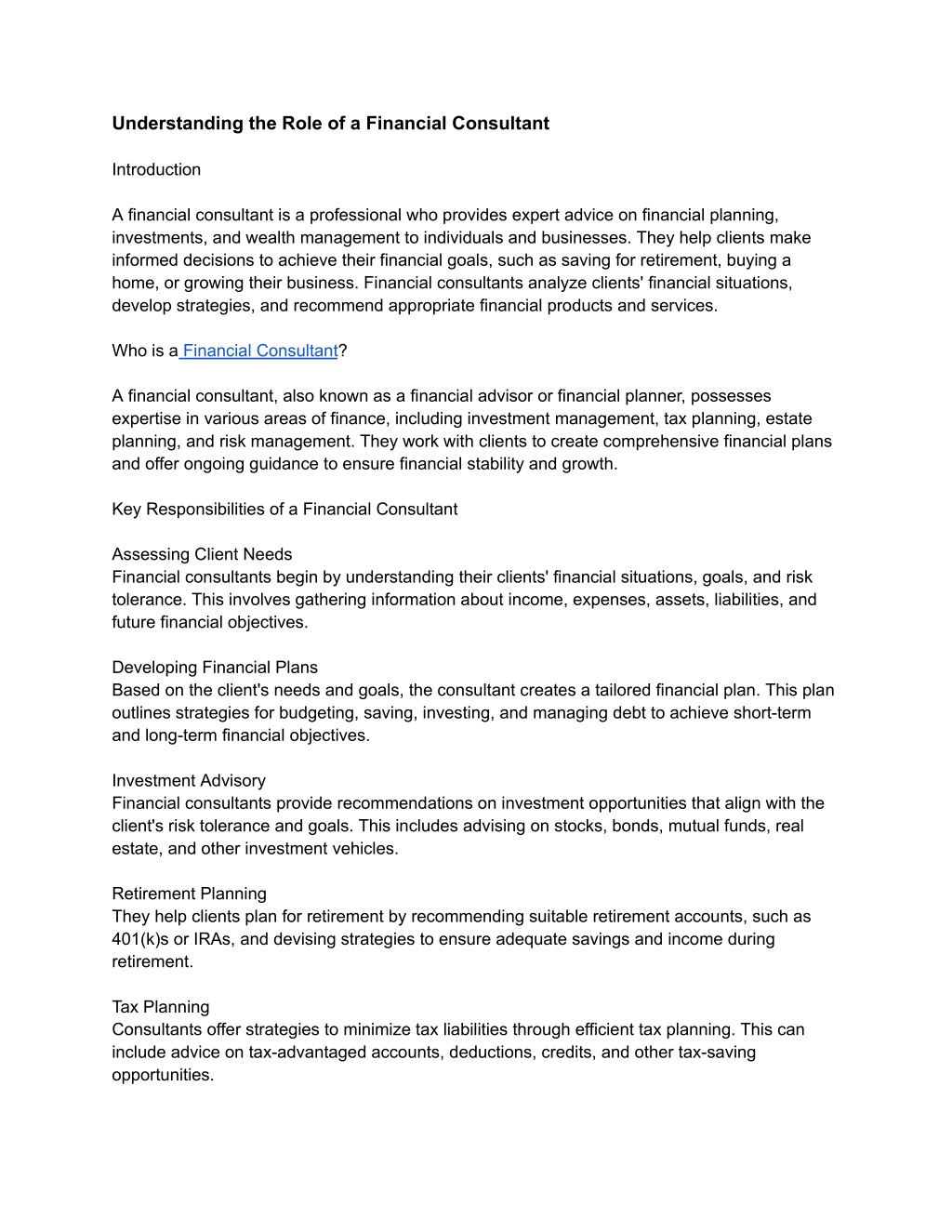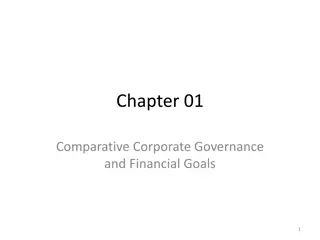
Understanding the Role of a Financial Consultant
A mutual fund advisor plays a pivotal role in helping individuals and institutions navigate the complexities of mutual fund investments. These professionals provide expert guidance tailored to an investoru2019s financial goals, risk tolerance, and investment preferences, making them invaluable in constructing and managing a diversified investment portfolio.n
Uploaded on | 0 Views
Download Presentation
Please find below an Image/Link to download the presentation.
The content on the website is provided AS IS for your information and personal use only. It may not be sold, licensed, or shared on other websites without obtaining consent from the author. Download presentation by click this link. If you encounter any issues during the download, it is possible that the publisher has removed the file from their server.
Presentation Transcript
Understanding the Role of a Financial Consultant Introduction A financial consultant is a professional who provides expert advice on financial planning, investments, and wealth management to individuals and businesses. They help clients make informed decisions to achieve their financial goals, such as saving for retirement, buying a home, or growing their business. Financial consultants analyze clients' financial situations, develop strategies, and recommend appropriate financial products and services. Who is a Financial Consultant? A financial consultant, also known as a financial advisor or financial planner, possesses expertise in various areas of finance, including investment management, tax planning, estate planning, and risk management. They work with clients to create comprehensive financial plans and offer ongoing guidance to ensure financial stability and growth. Key Responsibilities of a Financial Consultant Assessing Client Needs Financial consultants begin by understanding their clients' financial situations, goals, and risk tolerance. This involves gathering information about income, expenses, assets, liabilities, and future financial objectives. Developing Financial Plans Based on the client's needs and goals, the consultant creates a tailored financial plan. This plan outlines strategies for budgeting, saving, investing, and managing debt to achieve short-term and long-term financial objectives. Investment Advisory Financial consultants provide recommendations on investment opportunities that align with the client's risk tolerance and goals. This includes advising on stocks, bonds, mutual funds, real estate, and other investment vehicles. Retirement Planning They help clients plan for retirement by recommending suitable retirement accounts, such as 401(k)s or IRAs, and devising strategies to ensure adequate savings and income during retirement. Tax Planning Consultants offer strategies to minimize tax liabilities through efficient tax planning. This can include advice on tax-advantaged accounts, deductions, credits, and other tax-saving opportunities.
Estate Planning Financial consultants assist clients in planning for the transfer of their assets after death. This includes setting up wills, trusts, and other estate planning tools to ensure that clients' wishes are honored and their beneficiaries are protected. Risk Management and Insurance They evaluate clients' insurance needs and recommend appropriate coverage to protect against risks such as loss of income, health issues, property damage, and liability claims. Continuous Monitoring and Review Financial consultants regularly review and update clients' financial plans to reflect changes in their financial situation, goals, or market conditions. They provide ongoing advice to keep the financial plan on track. Benefits of Using a Financial Consultant Expertise and Knowledge Financial consultants have in-depth knowledge of financial markets, investment strategies, tax laws, and estate planning. Their expertise helps clients make informed decisions. Personalized Advice They offer customized financial advice based on each client's unique financial situation, goals, and risk tolerance. Time-Saving Financial consultants handle the complexities of financial planning, allowing clients to focus on other aspects of their lives or businesses. Objective Perspective Consultants provide an unbiased perspective on financial decisions, helping clients avoid emotional biases and make rational choices. Goal Achievement By developing and implementing a comprehensive financial plan, consultants help clients achieve their financial goals more effectively. Choosing the Right Financial Consultant Credentials and Qualifications Look for consultants with relevant credentials such as Certified Financial Planner (CFP), Chartered Financial Analyst (CFA), or Certified Public Accountant (CPA). These certifications indicate a high level of expertise and professionalism.
Experience Consider the consultant's experience in the financial industry. Experienced consultants are likely to have a deeper understanding of various financial scenarios and solutions. Fee Structure Understand the consultant's fee structure. Some charge a flat fee, others a percentage of assets under management, and some earn commissions on the products they recommend. Ensure the fee structure is transparent and aligns with your preferences. Communication Style Choose a consultant who communicates clearly and regularly. They should be able to explain complex financial concepts in an understandable manner and keep you informed about your financial plan's progress. Client Reviews and References Check reviews and ask for references from other clients to gauge the consultant's reliability and effectiveness. Compatibility Ensure that the consultant's philosophy and approach align with your financial goals and values. A good working relationship is crucial for successful long-term collaboration. Conclusion A financial consultant plays a vital role in helping individuals and businesses achieve their financial goals through expert advice and strategic planning. By understanding the responsibilities and benefits of a financial consultant, you can make an informed decision about partnering with a professional to navigate the complexities of financial planning. Selecting the right financial consultant will ensure that your financial future is well-managed and aligned with your objectives, leading to greater financial security and success.





























![Financial hardship and the economic burden of health [cancer] care](/thumb/779/financial-hardship-and-the-economic-burden-of-health-cancer-care.jpg)


















